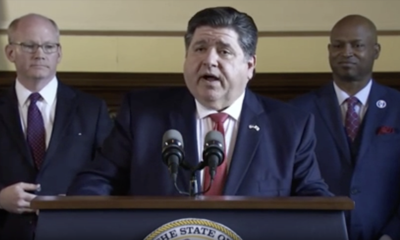
Illinois Gov. JB Pritzker, flanked by Illinois Senate President Don Harmon, left, and House Speaker Emanuel "Chris" Welch, right
Editor’s note: UPDATE The Illinois state Senate passed the measure on May 31. Illinois State Senate President Don Harmon signed on as the legislation’s chief sponsor in the Senate. The legislation will now advance to Gov. JB Pritzker for his signature.
SPRINGFIELD, ILLINOIS - Illinois business leaders are crying foul at a move by Illinois Democrats to rewrite the state's lawsuit rules to allow trial lawyers to force Illinois courts to hear lawsuits filed against employers and other businesses from throughout the country, even if a targeted company has no real ties to Illinois and the incident that triggered the lawsuit happened outside the state.
Business advocates assert passing such legislation, with minimal discussion and debate, would harm the state's economy by sending an ominous signal to many of the same companies Illinois' billionaire Democratic Gov. JB Pritzker is attempting to persuade to invest in Illinois.
"This will add to Illinois' reputation as a haven for trial lawyers and lawsuits," Mark Denzler, president and CEO of the Illinois Manufacturers' Association said, in response to questions from The Record. "Making Illinois a general jurisdiction state, with nexus determined simply because a company is registered to do business in Illinois, sends a strong anti-business message at a time when the governor and lawmakers are trying to attract new manufacturers to the state."
In the closing days of the Illinois General Assembly's spring legislative session, Springfield's Democratic supermajority appears to be moving quickly to ram through new legislation which would change the state's legal jurisdiction rules.
To this point, Illinois' courts have operated as so-called "specific jurisdiction" legal venues. This essentially means that, in order to file a lawsuit against a company or other particular defendant in Illinois courts, plaintiffs must first demonstrate either those particular defendants have sufficient ties to the state or that the incident that caused the alleged harms occurred in Illinois or has a strong enough connection to Illinois.
These specific jurisdiction rules, which have historically controlled in most U.S. states, have served to limit the legal exposure of companies which operate across state lines, blocking trial lawyers from essentially "forum shopping" by choosing to file lawsuits in courts in states considered to be more friendly to plaintiffs' pursuit of massive verdicts and settlements, often worth millions or even billions of dollars, or by even hammering companies with lawsuits over similar claims in multiple courts across the country.
Businesses and lawsuit reform advocates have denounced such tactics as abuses of the nation's legal system in pursuit of big profits for trial lawyers.
Those specific jurisdiction rules have not proven insurmountable to out-of-state claims, however.
For instance, in April, a federal judge in southern Illinois allowed plaintiffs from Ohio to sue Norfolk Southern Railway in that court over the deadly and destructive East Palestine, Ohio, freight train derailment. In the ruling, the judge backed plaintiffs' contention that Illinois was a proper legal forum for the lawsuit because the train that derailed in Ohio had originated in Decatur, Illinois.
However, under new legislation expected to win approval in Springfield, Illinois Democratic lawmakers would change Illinois to a so-called "general jurisdiction" legal destination.
Under the legislation, officially designated as Amendment 2 to Senate Bill 26, the law would be rewritten to subject any company that is registered to do business in Illinois to lawsuits in the state, specifically for "injury and illness resulting from exposure to a substance defined as toxic" under Illinois state law "whether the cause of action arises within or without the State."
The legislation sprang up suddenly on May 29, as Democrats tacked the language onto other legislation using a controversial legislative tactic, known as "gut and replace," which critics and judges alike have said allow lawmakers to bypass constitutional lawmaking rules to swiftly ram through controversial pieces of legislation with minimal debate.
Under that tactic, lawmakers first locate so-called "shell bills," or seemingly innocuous legislation that has already moved through most of the constitutionally required "three readings" process. Under the Illinois state constitution, new laws are supposed to receive three separate readings on three separate days in each house of the General Assembly before they can receive final votes and be advanced to the governor for signing.
The so-called "shell bills" have typically already received all but one of those required readings, before being set aside for future use.
Then, typically in the closing moments of a legislative session, members of the supermajority amend those "shell bills" with legislation that completely replaces everything but the title of the bill and allows often controversial legislation to be passed on just one reading and quick votes in both the state House and Senate, before advancing to the governor for a likely quick signature.
In recent years, Illinois Democrats have used that process to quickly enact a variety of controversial and constitutionally questionable laws, including state laws substantially reforming the state's criminal justice system, eliminating cash bail, outlawing so-called "assault weapons," and forbidding Illinoisans from challenging the constitutionality of new state laws, except in courts in Chicago and Springfield, among others.
Democrats also used the process to enact legislation granting trial lawyers the right to demand courts force businesses pay them and plaintiffs millions of more dollars in so-called "prejudgment interest," on top of potentially costly verdicts or settlements to resolve lawsuits. That particular legislation has been criticized as a "sop" to trial lawyers.
Now, Democrats appear poised to use the same "gut and replace" process to again give trial lawyers the ability to use Illinois courts to greatly expand the scope and reach of Illinois' famously plaintiff-friendly courts in Cook County and elsewhere in the state.
The "shell bill" chosen for the general jurisdiction legislation was known as SB26, which previously had involved legislation concerning child custody and parentage. All language concerning children and parents, however, was "gutted" from the bill in the Illinois House under Amendment 2, which inserted all of the language concerning legal jurisdiction and lawsuits.
Under the new legislation, Illinois trial lawyers are seeking to take advantage of a recent U.S. Supreme Court ruling. In the 2023 decision in Mallory v Norfolk Southern Railway, the high court ruled 5-4 that a similar general jurisdiction law in Pennsylvania didn't necessarily violate defendants' right to due process. That ruling brushed aside concerns that Pennsylvania's law had made courts in Philadelphia, in particular, a popular destination for so-called "litigation tourism," or out-of-state legal claims against companies not based in Pennsylvania.
Under the new general jurisdiction legislation, Illinois could follow in Pennsylvania's lawsuit, becoming perhaps the 12th state to enact a similar law.
When the legislation was introduced at a swift hearing before the House's Executive Committee on May 29, the legislation drew support from labor unions, the Illinois State Bar Association, the Illinois Environmental Council and the Illinois Trial Lawyers Association, among others.
The bill, however, drew strong objections from a coalition of nearly two dozen Illinois business advocacy groups. These included the Illinois Retail Merchants Association, Illinois Chamber of Commerce, Illinois Hotel and Lodging Association, Chemical Industry Council of Illinois, Illinois Manufacturers' Association, Illinois Trucking Association, and Illinois Railroad Association, along with the National Federation of Independent Business.
They were joined in opposition by legal reform advocates, including the Illinois Citizens Against Lawsuit Abuse.
In a joint statement, the business groups and lawsuit reformers called on Illinois lawmakers and Gov. Pritzker to reject the measure, which they said would harm Illinois' economy and only deepen its reputation as an anti-business lawsuit haven.
They noted similar legislation was rejected in New York under a veto from Pritzker's Democratic counterpart, Gov. Kathy Hochul. In vetoing the New York general jurisdiction law, Hohcul said such a law would lead to "massive increase" in lawsuits against businesses in that state's courts, "likely deterring out-of-state companies from doing business in New York because it would require them to be subject to lawsuits in the State regardless of any connection to New York." The legislation would "cause uncertainty for those businesses and burden the judicial system," Hochul warned.
Illinois business groups said Hochul's predictions would hold true for Illinois' economy and legal system, as well, should SB26 become law.
"Illinois should be cautious about taking a path that could make our courts a national magnet for toxic tort litigation," they said. "... We urge lawmakers to reject this amendment and instead support policies that promote fairness, protect due process, and encourage businesses to invest and grow in Illinois."
The legislation also drew a response from one of the leading U.S. national legal reform advocacy groups, the American Tort Reform Association (ATRA).
ATRA noted that powerful House Speaker Emanuel “Chris” Welch had signed on as one of the sponsors of the legislation and that Welch - like his predecessor, former Illinois House Speaker Michael J. Madigan, who was convicted on public corruption charges - now stands as Illinois’ top recipient of trial lawyer’s campaign donations.
“With this last-minute amendment, SB 26 is now one of the single worst pieces of legislation, nationwide, that we have seen this year,” said Tiger Joyce, president of ATRA. “This would open the floodgates to lawsuits from around the country, making every business registered in Illinois a target. For lawmakers to sneak this in at the final hour is incredibly telling of just how detrimental this legislation would be for hardworking Illinois families.”






